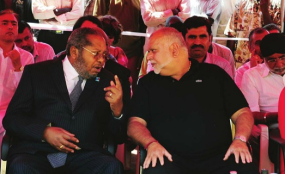OPINIONBy Prof George W. Kanyeihamba
Under normal circumstances where the economy is doing well, entrepreneurs and industrialists usually keep quiet, shun publicity and quietly enjoy the fruits of their labour.
Therefore, the constant alarms, public utterances and anxieties which have appeared in the media from time to time constitute bad omens for the whole country.
First, there was the heart rendering cry by a onetime claimed richest man in East Africa, Sudhir Ruparelia, when his financial empire and Crane Bank were reported to be in trouble. When the bank’s management was subsequently taken over by the Bank of Uganda, the bottom fell out of that bank.
I had interests in the survival of Crane Bank because as a co-founder and a shareholder of Kigezi Bank of Commerce, I and 320 other shareholders of the latter bank went to court and are still challenging the manner and style in which it was closed and eventually taken over by the owners of Crane Bank.
Secondly, Crane Bank remains one of my personal banks in which I have accounts.
Shortly after the bad news that Crane Bank had become insolvent, the media reported again that the government had extended a contribution to the bank of Shs200 billion.
Many readers thought that the bank’s problems would end with that contribution.
Unfortunately, the media started publishing stories that all was not well between the bank’s owners and the government.
This was followed by the announcement from Bank of Uganda that they were taking over the management of Crane Bank and its branches.
At this juncture, some customers and investors of Crane Bank were advised to withdraw their money from it presumably because it was in danger of disappearing under new management.
I am one of those customers who believed in the proficiency and credible abilities of Crane Bank’s owners and managers and I was advised by close friends in the bank that my money was safe there and I should not heed the alarming advice.
I was also assured by the announcements from the Central Bank that investments in Crane Bank were secure and we should not panic.
Up to now, I have not closed my accounts in that bank, notwithstanding dire warnings and friendly advice that I am mistaken and soon or later will regret the decision to continue trusting the owners and managers of the bank.
The latest media report that the Bank of Uganda is looking for buyers of the bank is not good news for us.
As between President Museveni and the owners of the bank, the President appears to fault the latter. On the other hand, Mr Sudhir places the blame squarely on what he calls President Museveni’s people.
In fact, one of his alleged statements in the media was framed as follows: “Museveni’s mafia have stolen my bank”.
In the High Court, a trial judge who gave the final judgment in the case of Kigezi Bank of Commerce opined that the plaintiffs did not prove that they had lost anything. When Crane Bank was taken over, the respondents in that case which is now in the Court of Appeal were reported to have said they want to stop government from taking over and managing Crane Bank because Kigezi Bank of Commerce, which they call National Bank of Commerce, lost a lot of assets and money when it was handed over to Crane Bank and that they wish to protect those investments and shares.
Without prejudice, this would seem to clearly contradict the judge’s findings, especially when his lordship ignored the earlier ruling of his colleague and its terms and conditions the earlier judge had set that the defendants appear before him and explain their decisions and actions relating to the manner they mismanaged the bank. They failed to obey that order.
Talking to owners and managers of other small banks, especially Ugandan founded and managed, businessmen blaming the government for the misfortunes of the Ugandan economy appear amply justified.
Prof Kanyeihamba is a retired Supreme Court judge.

